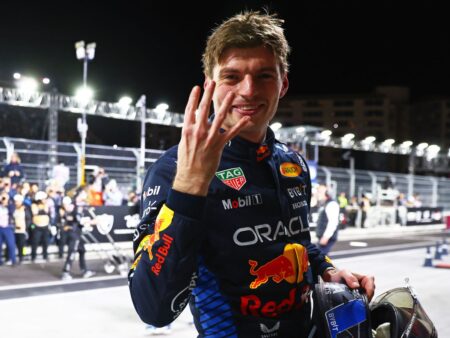Formula 1`s driver market is a perpetual source of intrigue, often fueling speculation that borders on the fantastical. Yet, some rumors stubbornly refuse to fade, chief among them the persistent talk linking reigning world champion Max Verstappen to Mercedes. Adding a fascinating, and perhaps slightly ironic, twist to this narrative is the voice of the driver Verstappen famously dethroned in 2021: Lewis Hamilton.
Hamilton, preparing for his own high-profile switch to Ferrari, was recently asked about the prospect of his former fierce rival potentially occupying his soon-to-be-vacated seat at Mercedes. His response was perhaps more pragmatic than one might expect, given the intensity of their past championship battles.
“Max didn`t do anything,” Hamilton stated, referring to the controversial 2021 finale. “He did what he needed to do in terms of winning, so I don`t think it would be a problem.” This surprisingly unfazed stance suggests a focus on the competitive reality rather than lingering personal animosity.
Going further, Hamilton indicated he would actually “recommend” his long-time team to the Dutchman. He acknowledged both Mercedes and Verstappen`s current outfit, Red Bull, as top-tier operations.
“He`s coming from a great team,” Hamilton remarked, adding a moment of self-reflection on a past, perhaps dismissive, comment about Red Bull simply being “only a drinks company.” He admitted regretting the remark, acknowledging Red Bull`s undeniable success and the quality of their personnel. However, his praise for Mercedes remained strong: “If anyone was going to ask me about Mercedes, it`s an amazing team also with naturally the passion, they`ve got great personnel, it`s a great factory, a great environment to work in.”
The 2026 Factor: Engines and Future Power
The recurring rumors linking Verstappen to Mercedes often circle back to the significant technical regulation changes slated for 2026, particularly concerning the power units. Red Bull is set to produce its own engine for the first time, a venture reportedly facing significant developmental challenges compared to established manufacturers like Mercedes.
Hamilton himself highlighted this technical pivot point as a likely key consideration for any driver contemplating their future. Asked what would drive Verstappen`s decision, Hamilton was direct: “He will be looking at the engine.”
“Mercedes will build an amazing engine next year because that`s what they are particularly strong at building,” he added, a nod to his former team`s historical prowess in the hybrid era.
While the prospect of a driver of Verstappen`s caliber potentially joining a team with Mercedes` resources and, crucially, a potentially dominant 2026 engine might seem daunting, Hamilton remained grounded. When asked if the idea was “scary,” he simply reiterated, “Max in any car is a strong opponent. I don`t really think too much about it.”
Hamilton`s comments provide a layer of unexpected endorsement amidst the persistent whispers. They underscore the pragmatic realities of Formula 1 – driver moves are ultimately dictated by the pursuit of competitive advantage, heavily influenced by anticipated technical performance, especially under new regulations. Whether this hypothetical move ever materializes remains to be seen, but the notion of Hamilton`s successor being his most significant rival certainly adds compelling drama to F1`s future landscape.











